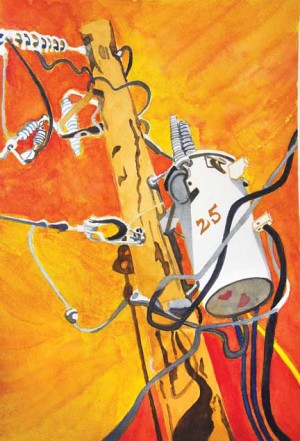by Martha Quillen
Getting citizens, parties and government officials to communicate, cooperate and work together is nigh impossible these days. But despite several decades of growing dysfunction, I thought we would eventually work things out, until I read Mistakes Were Made (but not by me): Why We Justify Foolish Beliefs, Bad Decisions, and Hateful Acts by Carol Tavris and Elliot Aronson. And it sure explains why America doesn’t function very well.
Don’t get me wrong. It is not the intent of the authors to imply that things can’t improve. But when you read their account of modern theories about brain function and behavior, it’s clear that humans are not particularly well-equipped to live in the society we’ve built.
According to Tavris and Aronson, people don’t handle conflicting ideas very well, due to something called cognitive dissonance. When ideas clash people get tense, so they do what they can to alleviate anxiety. But our natural reaction is not to carefully examine various ideas. It’s to defend the ideas that support our core beliefs, and discount and deny any ideas that don’t.
Toward that end, we resist, ignore and bury truths that conflict with our preconceived notions. We misremember history and situations to support our viewpoints, and we reject evidence of our own incompetence, meanness and faults.
As for other people’s transgressions? We justify our own errors but repudiate theirs.
In other words, people are unmitigated and natural prevaricators and often don’t even realize they’re lying, because they justify their wrongdoing not just for others, but for themselves: “Hey, I didn’t do it, and even if I did, it didn’t happen the way you think, and it never would have happened if other people hadn’t messed up first. And it’s actually a good thing it happened when it did, since only a few people were hurt,” the accused blusters after decimating his community by accident.
We all make mistakes, but psychological studies indicate that we often reject incontrovertible evidence of our own errors in order to avoid guilt, depression and loss of self-esteem. And we often don’t let new facts interfere with old assumptions. Mistakes Were Made tells of prosecutors who supported the validity of convictions despite recanting witnesses and new, overwhelming evidence, confirmed by DNA results.
And that’s human nature. People prefer information that backs their own opinions and they seek people and sources that agree with their viewpoints. Psychologists call this phenomenon confirmation bias, and it’s natural, because it boosts people’s confidence and assuages doubt. But studies indicate that if you evaluate situations with pre-existing prejudices in place, almost nothing – including clear-cut evidence – can change your mind.
And to make matters worse, confirmation bias helps people fool themselves, which allows them to maintain wrong, arrogant, ill-conceived positions with aplomb.
The authors, who are both social psychologists, glean several examples of such self-satisfied smugness from their own profession. They cite Freud’s claim that experimental verification of his psychoanalytic assertions was unnecessary because his theories worked so well. And they also write about the misguided therapists who propagated countless accusations of rape and molestation against innocent parents and daycare workers due to an unsubstantiated belief in repressed memories, satanic cults and rampant sexual predation.
Psychologists, however, aren’t the only professionals who let self-deception urge them into inducing pain and suffering. The authors share plenty of examples of egregious harm propagated by politicians, police, prosecutors, doctors and our forebears.
If only that was the end of it. But it may be just the beginning.
[InContentAdTwo]
Humans don’t handle conflicting ideas very well, yet our society is awash in them. We glorify peace, but get mired in war. We exalt life, but defend the engines of death – guns, executions and armies. We don’t debate ideas logically, and we almost never present all of the evidence. And now that millions of new, combative arguments can be accessed on the Internet?
We use them to build our confirmation bias into angry, self-deceptive platforms of righteousness. Our arguments tend to portray situations as black or white. Our politics tend to be two-sided and favor extremism. We pit pro-choice against pro-life, the Dream Act against walled borders armed by snipers, old-fashioned religion against secular humanism.
And somewhere along the way, we forget that our democratic government’s presumed role is to make life better for the greatest number of people – rather than to serve one side and suppress the other.
Dissonance is clearly not new (and bears a striking resemblance to what used to be called hubris). But the tension, discord and disharmony, which Mistakes Were Made illuminates, currently seem to be expanding into a mighty force.
Cognitive dissonance happens when times are tough and people are stressed, and Tavris and Aronson conclude that it’s something we should be aware of and resist. The authors also warn that lectures, accusations and aspersions make matters worse by feeding people’s feelings of being used, abused and unappreciated, and wounded people fight all the harder for respect, self-worth and recognition.
But why are we so angry and divided? Because of abortion? Immigration policy? The economy? The environment? Or is it because we desperately need more oil rigs or bike paths? No, it couldn’t possibly be that, because getting more stuff never resolves anything.
Nor does our constant conflict. So why are we so combative?
I suppose it’s because the future is uncertain, the past is not so clear, and the center (as in middle class) isn’t holding. Today, America’s industrial economy is dying; our new economy is changing; jobs are not what they used to be; and lots of people are struggling.
Yet almost everybody in Salida seems convinced that they know what to do.
However, every possible course presents advantages, side effects and dangers. Our city has favored substantial investment in recreation and tourism, which may serve us extremely well. Or the stock market could tank and quash tourism for years, thereby rendering all of Salida’s new recreational investments and plans moot.
Other Salidans prefer a less tourist-oriented town and thus favor reducing amenity budgets. And others approve of the city’s course, but would prefer that it be implemented at a much slower rate to allow for citizen adjustments to rising prices and traffic. And others support some proposals and hate others.
And as for me? I’m convinced that Carlisle, Farney, Hal Brown and the rest of the city council, Salida’s administrators, Moving Forward, Holding Back, and the “stop the train I want to get off” crowd are all supporting what they think is right – and best.
But they may all be wrong. And that’s likely why cognitive dissonance can shake people to their very core and make them tense, angry and non-cooperative.
Vastly conflicting visions of what is and what should be can make us realize that we don’t know where we’re going – even though we seem to be headed there faster than ever before.
Martha Quillen is going nowhere fast between Howard and Poncha Springs on the left side of the Arkansas.



